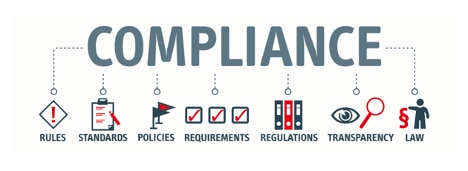What do compliance services look like?
Preparing an income tax return, filing sales tax, running payroll, or even reconciling a bank account are all compliance activities. Processes have been defined to ensure that federal, state, and local laws are followed, and accuracy and transparency exist in the company’s financial reports. Your job, as an accounting professional, is to stay apprised of changes and events that affect the reliability and compliance of your client’s records and reports.
When asked how she defined compliance advisory services, Jan Haugo defines it as bookkeeping, and includes it as part of the other services she offers. Many bookkeepers provide compliance advisory during the regular course of delivering their services. Compliance bookkeeping includes answering quick questions about how a transaction should be categorized, or how long they should retain transactional records.
Completing a clean-up engagement is, itself, a compliance activity because the client is asking you to organize the financial records in accordance with accounting standards and practices. In some cases, the advisory is inherently included with the services you provide, while in other cases, it could (and should) be offered as a separate service.
In other situations, a separate engagement for advisory services is warranted. Dawn says that clean-up engagements often lead to additional opportunities for advisory engagements, such as internal control assessments or a full-on forensic examination. She makes the analogy of remodeling a house: “As you start to take the walls down, you inevitably uncover issues that need to be addressed to ensure the stability and strength of the foundation the house is built on.”
Types of compliance and forensic services
There is a vast range of compliance advisory services needed by most organizations that you are likely already providing to your clients. The key for growing accounting and bookkeeping firms is to identify and monetize advisory opportunities that are beyond the scope of your regular service engagements, and offer them as add-on services with their own specific engagement and terms.
Let’s explore some services you may already provide, but are considered advisory services.
Help with business registration/deregistration. All new businesses are required to register with the federal government, and the states and towns they operate in. You likely provide guidance on the types of forms that need to be filed, and may even help complete them.
Be careful to avoid inadvertently offering legal advice or services to your client. Helping a client complete a business registration form may be appropriate, but helping a client complete their articles of organization, or other legal organizational documents, is considered the unauthorized practice of law. According to Mark Theoharis, an attorney and writer, “While license requirements differ slightly from state to state, all states make it illegal to engage in the practice of law without first obtaining a license. Anyone engaged in the practice of law without a license commits a criminal act.” A best practice is to find an attorney you can partner with to help provide your clients with legal advice and services.
Accounting system setup. Making recommendations and setting up your client’s accounting system is another form of advisory service. Selecting the correct chart of accounts, designing workflows, and creating internal control procedures are valuable services that should be priced appropriately. If you retain a new bookkeeping client, consider offering QuickBooks® setup as a separate service, and charge appropriately for it.
Audit support and tax representation. Helping clients who receive letters from the IRS, or state and local taxing authorities, is another advisory service you can provide. However, you must be authorized to represent clients before the IRS and state taxing authorities. Representation allows you to correspond and negotiate with the taxing authorities on the client’s behalf. Audits can be related to income tax, sales tax, payroll taxes, and even property taxes, in some cases.
Workers’ compensation/other insurance audit reporting. Workers’ compensation insurance policies are priced based on the expected payroll for the policy period. At the end of the policy, an audit is done to “true-up” the policy price based on the actual payroll amounts for the policy period. If a client does not submit the audit report, the insurance company can lock in the quoted rate, and clients can end up leaving money on the table.
Assistance with loans. Many clients need help organizing documents and other information to apply for various loans. They also may need guidance on the best credit card products, merchant service providers, or loan products.
Specialty compliance services require deep knowledge and specialized skill sets because they are subject to specific rules and regulations. Examples of specialty compliance services include the following:
Federal defense contracting accounting audit support. Contractors who provide services to certain U.S. government agencies are subject to the Federal Acquisition Regulation (FAR). These regulations, set forth by the Office of Regulation Management and enforced by the Defense Contractor Management Agency (DCMA), are quite extensive. Contractors are subject to mandatory audits of their accounting system processes, as well as an annual audit of their financial records for each year they receive contracts. Setting up a FAR compliant accounting system can be tricky, so providing guidance to small businesses subject to these rules is a valuable and lucrative service offering.
Internal control assessments. As a business grows and hires staff, internal controls become an essential need to protect against fraud. You can provide internal control assessments to help clients uncover inadequacies, and create processes and procedures to protect firm interests. An internal control checklist is a great example to help get you started!
Subject matter expert or expert witness. As your breadth of knowledge and experience grows, opportunities to become a subject matter expert or expert witness in legal proceedings can provide you with a lucrative new revenue stream for your firm. Not to mention, it can be super exciting and fulfilling work. Specializing in a particular discipline is a great way to set you and your practice apart, as well as earn higher fees for your services!
Where to start
How can you get started on your path to providing compliance and advisory services? Jan suggests doing an internal firm assessment to analyze your firm’s existing core competencies, and make a list of areas where you feel you and your team stand out.
You can also find training classes and certifications that will build your knowledge and expertise. The AIPB offers training and a certified bookkeeper designation, while the AICPA offers training programs on a wide variety of compliance topics. Intuit® also offers training programs through the QuickBooks ProAdvisor® program and the Intuit Accountants Training center.
If you’re interested in exploring compliance and forensic work, Dawn suggests partnering with an accounting professional who is already established in your desired area of expertise. She says, “Bookkeepers are the ones on the front line! [Consider working] with a CPA – teams are best.” Not only will you get your feet wet actually doing the work, but it’s also fantastic to build your network and gain referrals.
If you’re all in and looking to become a fraud expert, the AICPA offers several certificate programs and certification in financial forensics for CPAs. The ACFE (Association of Certified Fraud Examiners) offers training and administers the CFE exam, which is open to non-CPAs with a bachelor’s degree or equivalent experience.
While anyone can prepare tax returns for clients, you must be authorized to represent clients before the IRS and state taxing authorities. CPAs and attorneys are allowed to represent clients under audit as part of their licensing. Non-CPAs can become licensed by the IRS to represent clients by becoming an enrolled agent. An enrolled agent must complete an application, background check, and pass a two-day tax-only exam to become certified. They must also meet ongoing continuing education requirements and renew their license every three years.
Best practices and advice from the experts
I had the pleasure of sitting down with Dawn Brolin and Jan Haugo to hear about their experiences and advice for ProAdvisors looking to explore compliance and forensic advisory services. Read on to learn more about how these services are offered and implemented in real life!
Q: Does your firm offer compliance advisory services as a bundle with other monthly offerings?
Jan Haugo: Yes, we offer sales and payroll tax compliance advisory services, along with additional advisory services for larger clients. The services are scoped out in our initial onboarding of the client, and then priced and bundled with our monthly fees.
Dawn Brolin: We don’t. All compliance advisory services are billed project-based or hourly, depending on the situation. If a need is uncovered during a regular monthly engagement, we will recommend services based on those findings.
Q: How do you explain compliance advisory services to your clients?
JH: Compliance advisory comes in many forms, and would include tax/regulatory advice, loan advisory compliance, and institutional needs, such as personal asset statements.
DB: We explain to our clients that compliance isn’t just making sure that you are compliant with filing tax returns, or compliant with paying your payroll taxes. That is important in the endgame, but having that confirmation that your data is accurate is what keeps you compliant. You have to make sure you’re not fraudulently recording an expense, or fraudulently understating your income in order to suppress the tax burden. Often, I’ll reference an existing case that I’ve seen to illustrate the importance of staying compliant. We also explain that we want internal controls in place and compliance when clients are thinking about succession planning. No company wants to buy a disorganized wreck! Without any internal controls or proper procedures, the value of the company goes down.
Q. How do you set client expectations/timeline for transformation for compliance advisory services?
JH: We provide a highlight and overview of potential compliance pitfalls. We work with the client to show the ability to meet those deadlines and the overarching impact on their business.
DB: We compile a list of areas that need to be addressed, and then sit down with the client and say, “Let’s look at the highest risk area of the items that I’ve identified. Anything immediate to high risk should be fixed in 30 days or less. The timeline goals are always based on the risk level to the organization. We also discuss the budget and quantify the results.
Q. How do you provide compliance advisory services to your clients? What does a typical engagement look like?
JH: A review of current compliance and workflow will highlight a lot of opportunities.
DB: I look at the high level first, then dig into the details.
Q. How do you promote compliance advisory services? How do you target your clients?
JH: Having a meeting to talk about the review of the books and the client needs offers the opportunity to question and deep dive into these potential areas of compliance.
DB: All of my clients are referrals. Fraud and resolution cases come in from colleagues from conferences and webinars. Most engagements are big ones!
Q. What have you learned throughout your experience and want to share with others?
JH: This can be a complicated regulation web, but manageable, and it’s important to get an understanding of it. Compliance advisory is more than filling out forms; it’s also knowing what information is required and when, as well as maintaining relationships in order to keep up with rules and regulations.
DB: It’s not hard to get started. Pick a client and use them as your test client. Go through their books and find out if they have documented their processes. If you want to take it a step further, subscribe to Eric Green’s program on Tax Representation. Also, know that you don’t have to be a CPA to become a CFE. Join the ACFE to learn more and start the training processes.


